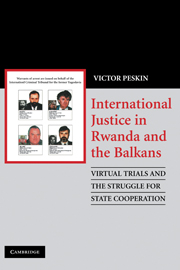 International Justice in Rwanda and the Balkans
International Justice in Rwanda and the Balkans Book contents
- Frontmatter
- Contents
- Maps and Timelines
- Acknowledgments
- Permissions
- Note on Pronunciation
- MAP 1 Map of the Former Yugoslavia
- MAP 2 Map of Rwanda
- PART I INTRODUCTION
- PART II THE BALKANS: STRATEGIES OF NON-COMPLIANCE AND INSTRUMENTS OF PRESSURE
- 2 Slobodan Milošević and the Politics of State Cooperation
- 3 International Justice and Serbia's Troubled Democratic Transition
- 4 Franjo Tuđman and the Politics of International Justice
- 5 The Politics of State Cooperation in Croatia's Democratic Era
- PART III RWANDA: VIRTUAL TRIALS, INTERNATIONAL JUSTICE, AND THE POLITICS OF SHAME
- PART IV CONCLUSION
- Bibliography
- Index
2 - Slobodan Milošević and the Politics of State Cooperation
Published online by Cambridge University Press: 05 September 2012
- Frontmatter
- Contents
- Maps and Timelines
- Acknowledgments
- Permissions
- Note on Pronunciation
- MAP 1 Map of the Former Yugoslavia
- MAP 2 Map of Rwanda
- PART I INTRODUCTION
- PART II THE BALKANS: STRATEGIES OF NON-COMPLIANCE AND INSTRUMENTS OF PRESSURE
- 2 Slobodan Milošević and the Politics of State Cooperation
- 3 International Justice and Serbia's Troubled Democratic Transition
- 4 Franjo Tuđman and the Politics of International Justice
- 5 The Politics of State Cooperation in Croatia's Democratic Era
- PART III RWANDA: VIRTUAL TRIALS, INTERNATIONAL JUSTICE, AND THE POLITICS OF SHAME
- PART IV CONCLUSION
- Bibliography
- Index
Summary
Introduction
Beyond the tribunal courtroom lies a virtual trial that determines who will stand actual trial for war crimes, crimes against humanity, and genocide. Whereas the courtroom trial is fought over the guilt and innocence of the individual defendant, a virtual trial – what I also call a “trial of cooperation” – is waged between the tribunal and the targeted state over whether that state will facilitate investigations, indictments, and prosecutions of members of its own national, ethnic, or political group. The aim of this case study is to reveal the dynamics of such virtual trials between the International Criminal Tribunal for the Former Yugoslavia (ICTY) and the Serbian government. These virtual trials are most consequential for the ICTY because Serbian war crimes lie at the epicenter of the Balkan wars and comprise the primary focus of the tribunal's prosecutions. With Slobodan Milošević's fall from power in 2000 and the demise of authoritarianism, Belgrade's defiance slowly gave way to increased cooperation. Still, Serbia has been the most difficult state for the ICTY, as underscored by Chief Prosecutor Carla Del Ponte's lament in my 2003 interview with her: “It is an incredible, incredible situation. We always have a problem with Serbia. Always.”
The Serbian case study will be divided into two chapters. In this first chapter, I will examine the struggle between the ICTY and the Serbian government during Serbia's authoritarian period that lasted until Milošević's fall from power in October 2000.
- Type
- Chapter
- Information
- International Justice in Rwanda and the BalkansVirtual Trials and the Struggle for State Cooperation, pp. 29 - 60Publisher: Cambridge University PressPrint publication year: 2008
- 1
- Cited by


